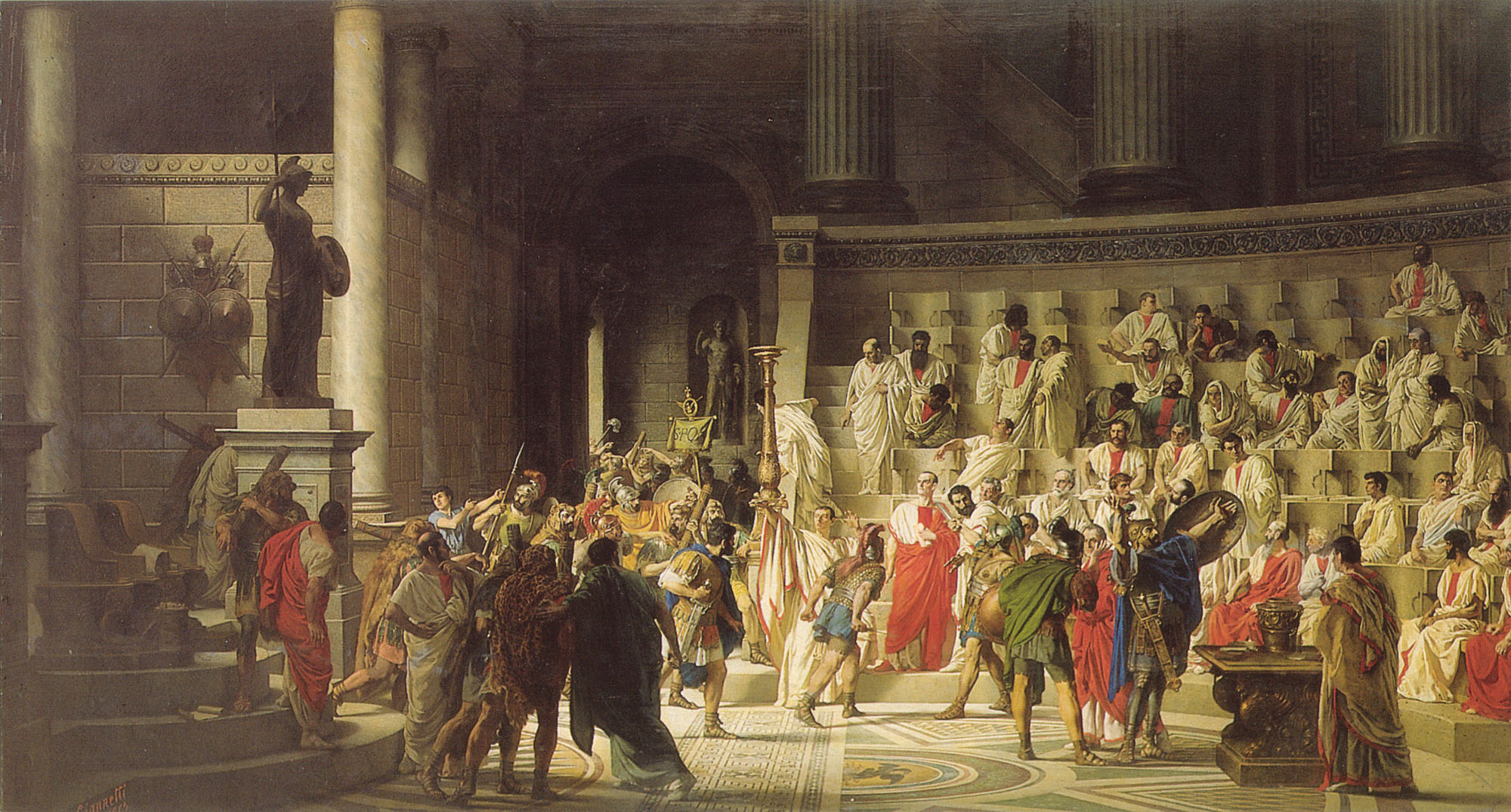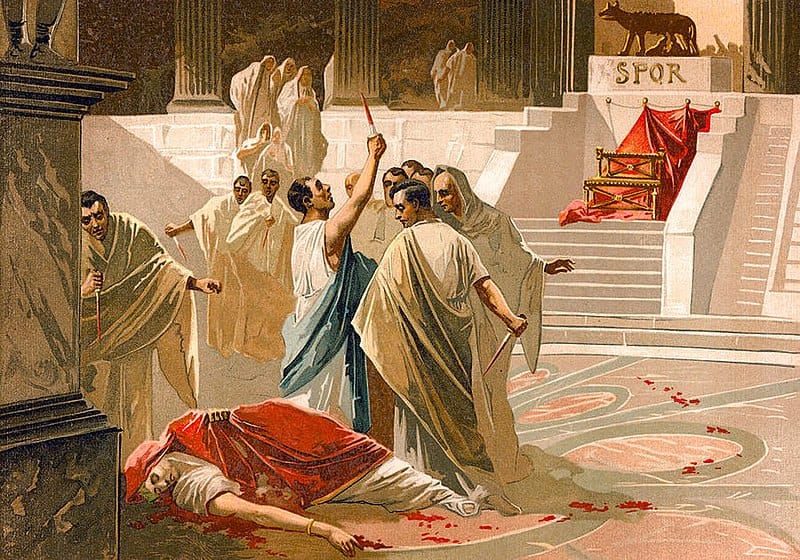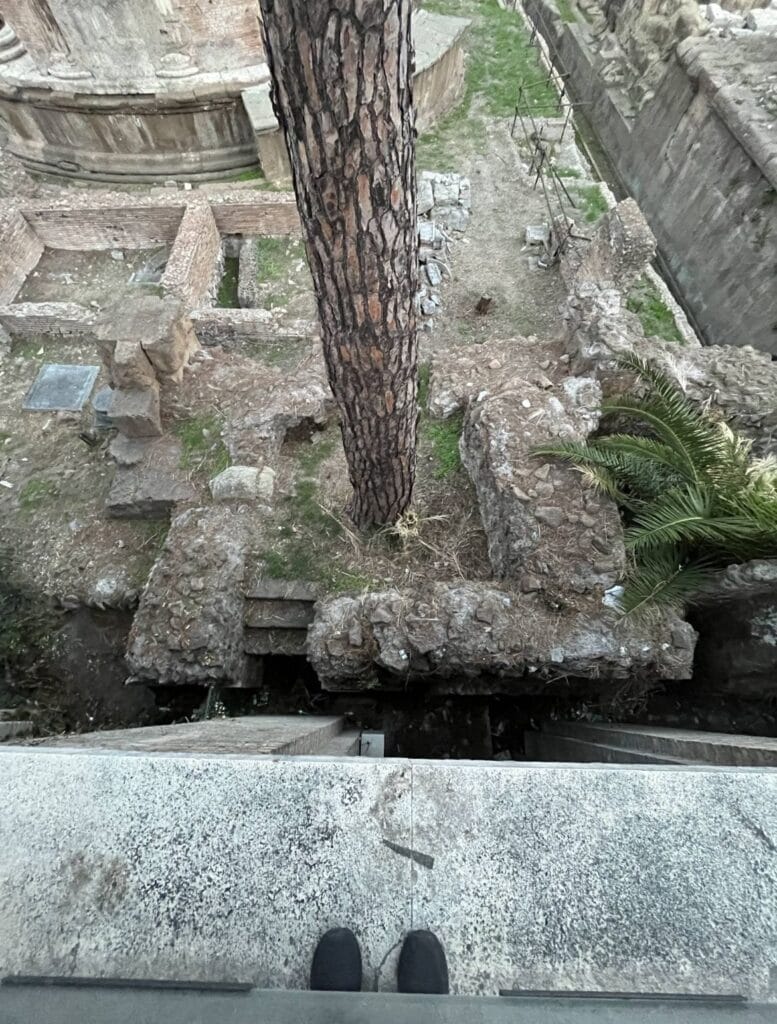Within the busy streets of Rome, amidst the whispers of history, lies a spot that thunders with the echoes of betrayal and power struggles of antiquity. “This is the spot where Julius Caesar was assassinated” – a statement that pierces through the veil of time, transporting us to a key moment in the annals of human civilization. In the shadow of the Theatre of Pompey, where ancient stones hold secrets untold, the assassination of Caesar unfolds as a timeless tale of ambition, conspiracy, and the fragility of power.
As we stand upon this sacred ground, it serves not only as a marker of historical significance but also as a gateway to understanding the complexities of political intrigue and the consequences of unchecked ambition. Join us on a journey back in time as we traverse the cobblestone streets of ancient Rome, exploring the events leading up to that fateful day, the motives of the conspirators, and the far-reaching repercussions that would shape the course of Western civilization. But what led to this assassination, and where is that infamous spot?

Rise Of Caesar
Although he had many obstructions, Julius Caesar achieved more political power in Rome than anyone before him. Julius Caesar’s journey to power began with his entry into Roman politics in his early twenties. Born into a prestigious family, he quickly rose through the ranks, serving in various minor offices and gaining military experience in campaigns across the empire.
His pivotal moment came with his appointment as governor of Further Spain, where he demonstrated both effective governance and military leadership. Upon his return to Rome, Julius Caesar faced significant debts but endeared himself to the common people by championing debt relief and land distribution for veterans. In 59 BCE, Caesar achieved the pinnacle of Roman politics: the consulship. This marked a turning point in his career, granting him considerable authority and influence within the Roman state. However, it was his strategic alliances, notably the First Triumvirate with Pompey and Crassus, that solidified his political power.
Caesar’s military conquests in Gaul further enhanced his prestige and wealth, laying the groundwork for his eventual dominance in Rome. Despite tensions with Pompey and the Senate, Caesar’s decisive actions, including his defiance of Senate orders and crossing the Rubicon River, ultimately led to his victory in the Civil War and his ascent to dictatorial powers.
Civil War
The civil war that unfolded between Julius Caesar and his rival, Pompey the Great, was a defining moment in Roman history, marked by political intrigue, military conflict, and the collapse of the Roman Republic. The seeds of the civil war were sown by growing tensions between Caesar and Pompey, exacerbated by their competing ambitions and divergent political interests. Despite their previous alliance in the First Triumvirate, cracks began to emerge as their relationship deteriorated, fueled by the Senate’s fear of Caesar’s increasing power and Pompey’s desire to maintain his own influence.
In 49 BCE, the Senate, under Pompey’s influence, issued a decree demanding Caesar’s immediate return to Rome and the disbandment of his legions. Julius Caesar, aware of the Senate’s hostility and fearing for his safety, made the fateful decision to cross the Rubicon River with his loyal legions, a symbolic act of defiance and a declaration of war.
What followed was a series of military campaigns and decisive battles that unfolded across the Roman world. Caesar’s lightning-fast march through Italy caught Pompey and his supporters off guard, forcing them to retreat to Greece. The subsequent Battle of Pharsalus in 48 BCE saw Caesar’s forces emerge victorious, dealing a crippling blow to Pompey’s army and effectively ending his resistance.
Pompey fled to Egypt, where he was betrayed and assassinated, while Caesar pursued his adversaries relentlessly, solidifying his control over the Roman world. Despite pockets of resistance and lingering opposition from some members of the Senate, Caesar’s authority was now unchallenged, paving the way for his assumption of dictatorial powers. The Civil War marked the end of the Roman Republic and the beginning of Caesar’s autocratic rule.
The Dictatorship
Julius Caesar’s assumption of dictatorial powers marked a pivotal moment in Roman history, signaling the end of the Republic and the emergence of autocratic rule. Following his victory in the civil war against Pompey and his allies, Caesar consolidated his authority and implemented a series of measures to solidify his grip on power. In 46 BCE, Caesar was appointed dictator of Rome, a position that granted him supreme authority over the state. Unlike the traditional Roman dictatorship, which was a temporary measure enacted during times of crisis, Caesar’s dictatorship was open-ended and devoid of any constitutional checks or balances.

As dictator, Caesar pursued a wide-ranging agenda aimed at centralizing power and reforming the Roman state. He enacted legislation to address social and economic inequalities, including land redistribution to veterans, debt relief for the poor, and measures to alleviate urban poverty. Caesar also undertook ambitious infrastructure projects, such as the construction of new public buildings and roads, aimed at revitalizing the city of Rome and stimulating the economy.
In addition to his domestic policies, Caesar embarked on military campaigns to expand Roman territory and secure Rome’s borders. His conquests in North Africa, Spain, and the eastern Mediterranean further enhanced his prestige and solidified his status as Rome’s undisputed ruler.
Despite his popularity among the common people and some segments of the elite, Caesar’s growing autocracy and ambitions for monarchical power alienated many members of the Senate and aristocracy. Julius Caesar’s decision to accept honors traditionally reserved for kings, such as the title of dictator perpetuo (dictator in perpetuity) and the use of regal insignia, fueled fears of tyranny and sparked resentment among his political opponents.
The Opposition
The opposition to Julius Caesar’s dictatorship within the Senate was formidable and complicated, representing a diverse array of political ideologies and personal ambitions. This opposition united around senators who were deeply committed to preserving the traditional republican institutions of Rome and wary of Caesar’s increasing autocratic tendencies. Prominent figures among the senatorial opposition included Cato the Younger, a staunch defender of republican virtue and a vocal critic of Caesar’s tyranny. Cato’s unwavering opposition to Caesar’s dictatorship led him to participate in the conspiracy to assassinate Caesar in 44 BCE.
Another key figure in the senatorial opposition was Marcus Junius Brutus, a senator with familial ties to Caesar and a reputation for philosophical integrity. Despite his personal relationship with Caesar, Brutus felt compelled to join the conspiracy against him, driven by a commitment to republican principles and a desire to protect the integrity of the Roman state.
Other senators, such as Cicero, the renowned orator and statesman, expressed reservations about Caesar’s growing power but ultimately sought to maintain a pragmatic relationship with him in order to safeguard their own interests. Cicero’s writings and speeches reflect his ambivalence towards Caesar, acknowledging his achievements while also warning against the dangers of unchecked tyranny.
While these senators represented the most vocal and visible opposition to Caesar’s dictatorship, there were undoubtedly others within the Senate who shared similar concerns about the erosion of republican norms and the concentration of power in the hands of a single individual. However, the fear of reprisal and the allure of Caesar’s patronage prevented many from openly challenging his authority.
The Assassination
The assassination of Julius Caesar on the Ides of March, March 15, 44 BCE, unfolded amidst the political tension and intrigue that gripped the Roman Republic at the time. Here’s a more detailed account of the events leading up to and surrounding the assassination:
As Julius Caesar arrived at the Senate meeting held in the Theatre of Pompey, he was met by a group of senators, including some of his closest allies and bitterest enemies. Among them were Marcus Junius Brutus, a senator with familial ties to Caesar but who had become increasingly disappointed with his autocratic rule, and Gaius Cassius Longinus, a former ally turned staunch opponent of Caesar’s dictatorship.
Decimus Brutus, a trusted friend and confidant of Caesar, had played a crucial role in convincing Caesar to attend the Senate meeting under false pretenses. Decimus assured Caesar that the Senate intended to bestow upon him the title of king, a prospect that Caesar found deeply troubling given Rome’s aversion to monarchy. Unbeknownst to Caesar, the Senate meeting had been orchestrated as a pretext for his assassination. As Caesar took his seat in the Senate chamber, the conspirators, concealed among the senators, closed in around him. Drawing their concealed daggers, they launched a coordinated attack, stabbing Caesar repeatedly in a frenzied assault.

Caesar, caught off guard by the suddenness of the attack, initially attempted to defend himself but soon realized the futility of resistance against the overwhelming number of assailants. According to historical accounts, Caesar’s last moments were marked by a mixture of defiance and resignation, culminating in the famous utterance, “Et tu, Brute?” (“And you, Brutus?”), as he recognized Brutus among his attackers.
The assassination of Julius Caesar sent shockwaves throughout Rome, plunging the city into a state of turmoil and uncertainty. While the conspirators may have harbored hopes of restoring the Republic by eliminating Caesar, their actions instead precipitated a power struggle that ultimately led to the demise of the Republic and the rise of the Roman Empire under Caesar’s adopted heir, Octavian (Augustus).
The assassination of Julius Caesar remains one of the most dramatic and consequential events in ancient history, symbolizing the complex interplay of ambition, betrayal, and political idealism that defined the twilight years of the Roman Republic. But where exactly it happened?
Did Caesar Actually Say “Et Tu Brute?”
For centuries, the phrase “Et tu, Brute?” has lingered in the collective memory as a symbol of betrayal, yet its historical accuracy is debated among scholars. While William Shakespeare immortalized these words in his play “Julius Caesar,” there is little evidence to suggest that Julius Caesar uttered them during his assassination. Instead, this poignant utterance is widely regarded as a dramatic invention by Shakespeare, designed to enhance the emotional weight of Caesar’s downfall.
Adding depth to this exploration, the context of Caesar’s assassination on the Ides of March 44 BCE reveals complex political dynamics and personal grievances. The conspirators, led by Brutus and Cassius, were driven by a combination of political idealism and personal motivations. Shakespeare’s rendition of events captures the tension and drama of the moment, reshaping historical facts to serve the narrative.
Shakespeare’s influence has significantly shaped public perception of historical figures and events, with his fictionalized speeches often accepted as historical fact. This tendency highlights the enduring power of dramatic storytelling in cementing legends while blurring the lines between history and fiction.
Key Takeaways
- The phrase “Et tu, Brute?” is a Shakespearean creation, not a historical fact.
- Shakespeare’s dramatization enhances historical events for literary impact.
- Historical and fictional accounts often blend in public perception.
Historical Accuracy of ‘Et tu Brute?’

The phrase “Et tu, Brute?” is famously attributed to Julius Caesar during his assassination, though its historical accuracy is debated. This section examines ancient sources and Shakespeare’s influence to clarify its origins.
Accounts from Ancient Sources
Ancient texts provide varying accounts of Julius Caesar’s assassination. Plutarch, in his work “Life of Caesar,” notes Caesar’s shock and betrayal at seeing Brutus among the conspirators. However, Plutarch does not include the specific phrase “Et tu, Brute?”
Suetonius, another Roman historian, mentions a Greek phrase, “Kai su, teknon?” which translates to “You too, my child?” This suggests possible influence or modification by later writers. Given the lack of concrete evidence, it remains uncertain if Caesar uttered these exact words.
These accounts highlight the complexities and challenges in determining historical accuracy based on ancient sources.
Shakespeare’s Interpretation
In Shakespeare’s play “Julius Caesar,” the line “Et tu, Brute?” dramatizes Caesar’s betrayal by his confidant Brutus. Shakespeare drew inspiration from historical texts but often emphasized drama and emotion over precise historical accuracy.
His inclusion of the Latin phrase not only intensified the tragedy’s impact but also aligned with Renaissance audiences’ understanding of Roman history. Shakespeare’s dramatization has since shaped popular perceptions of the event, embedding the line in cultural memory despite its dubious historical authenticity.
Shakespeare’s influence underscores how literary interpretation can alter historical narratives, making the distinction between fact and fiction more complex.
The Aftermath
Julius Caesar’s assassination triggered widespread political instability and turmoil in Rome. With the power vacuum left by his death, a struggle for control ensued among rival factions, leading to a series of civil wars. Amid this chaos, Octavian, Caesar’s adopted heir, emerged as a prominent figure, eventually establishing the Roman Empire. The Republic’s collapse marked a pivotal moment in Roman history, signaling the end of traditional republican governance and the dawn of imperial rule. Despite his demise, Caesar’s legacy endured, leaving an enduring impact on Roman politics, military conquests, and societal reforms.
The Spot

Julius Caesar met his fate within the Curia of Pompey, an integral part of the Theatre of Pompey complex, where the Roman Senate had convened on the Ides of March, 44 BCE. This historic structure, situated in the heart of Rome’s Campus Martius, bore witness to the dramatic events that unfolded during Caesar’s assassination.
Today, the site of Julius Caesar’s assassination within the Theatre of Pompey complex is marked by archaeological remains and historical markers in the heart of modern-day Rome. While the exact spot of the assassination may not be visually distinguished, visitors can explore the ruins of the Theatre of Pompey and its surrounding structures, which offer glimpses into the architectural grandeur of ancient Rome.
The archaeological site includes remnants of the theater’s seating areas, stage, and porticoes, providing insight into the scale and layout of this once-impressive venue. Visitors can also explore the remains of the Curia of Pompey, where the Roman Senate convened and where Caesar met his tragic end.
While much of the original structures have been lost to time and urban development, ongoing archaeological efforts continue to uncover new insights into the history and significance of the Theatre of Pompey and its association with Julius Caesar’s assassination. Interpretive panels and signage at the site offer historical context and information for visitors keen to learn more about this pivotal moment in Roman history.
Surrounded by the bustling streets and modern buildings of Rome, the site serves as a poignant reminder of the city’s rich and complex past, where ancient history intersects with the present-day urban landscape.
People Also Ask:
What is Gaius Julius Caesar known for?
Julius Caesar was a political and military genius who overthrew Rome’s decaying political order and replaced it with a dictatorship. He triumphed in the Roman Civil War but was assassinated by those who believed that he was becoming too powerful.
What happened to Gaius Caesar?
Gaius established a pro-Roman king on the Armenian throne but was seriously wounded (2 CE) while attempting to suppress an uprising in the area. He eventually died of his wounds on his way back to Italy. His death forced Augustus to adopt Tiberius and make him his successor.
Did Julius Caesar have a child with Cleopatra?
Caesarion (born on the 23rd of June, 47 BC) was the son of Cleopatra VII and Caesar. The child appears early in hieroglyphic Egyptian sources as Pharaoh and son of Caesar, whereas in Rome itself, Caesar seems never to have mentioned the child.
Who ruled after Gaius Julius Caesar?
Augustus (Gaius Octavius) was named in Caesar’s will as his heir, which made him extremely rich. He was able to attract a loyal following among a number of Caesar’s legions. He also had a best friend, Marcus Vipsanius Agrippa, who was a talented military commander.
How long did Caesar rule Rome?
It became a title rather than a name. In contrast, Julius Caesar could be considered the ruler of Rome for at most four years. His assassination was evidence that his rule was far less than total.
Was Caesar a good ruler?
Julius Caesar did many important things during his lifetime. He was a brilliant military leader, nearly doubling the size of Roman lands. He implemented many reforms that benefited the Roman economy. Caesar brought stability and organization to the Roman Republic.
What does the name Julius mean?
Julius is a masculine name of Greek origin, meaning “devoted to Jove.” This Roman name is thought to be related to the Roman god Jupiter, who was also known as Jove. Jupiter was known as the king of gods or the god of the sky and thunder, granting him many powers, including that of controlling the weather.
Hello, my name is Vladimir, and I am a part of the Roman-empire writing team.
I am a historian, and history is an integral part of my life.
To be honest, while I was in school, I didn’t like history so how did I end up studying it? Well, for that, I have to thank history-based strategy PC games. Thank you so much, Europa Universalis IV, and thank you, Medieval Total War.
Since games made me fall in love with history, I completed bachelor studies at Filozofski Fakultet Niš, a part of the University of Niš. My bachelor’s thesis was about Julis Caesar. Soon, I completed my master’s studies at the same university.
For years now, I have been working as a teacher in a local elementary school, but my passion for writing isn’t fulfilled, so I decided to pursue that ambition online. There were a few gigs, but most of them were not history-related.
Then I stumbled upon roman-empire.com, and now I am a part of something bigger. No, I am not a part of the ancient Roman Empire but of a creative writing team where I have the freedom to write about whatever I want. Yes, even about Star Wars. Stay tuned for that.
Anyway, I am better at writing about Rome than writing about me. But if you would like to contact me for any reason, you can do it at contact@roman-empire.net. Except for negative reviews, of course. 😀
Kind regards,
Vladimir
